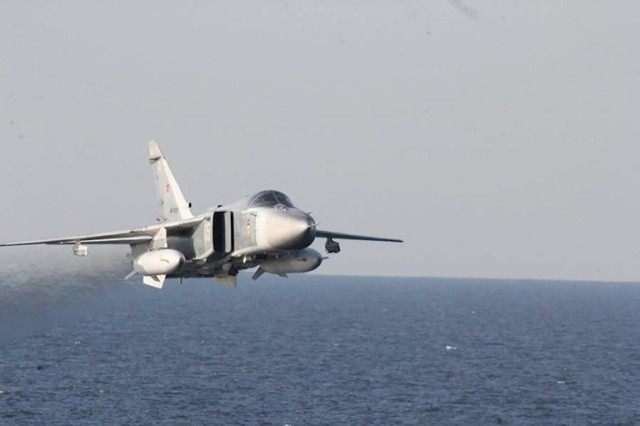On Sunday, U.S. officials revealed another incident involving Russian pilots acting in an “unsafe and unprofessional” manner over the Baltic Sea. This time, a Russian fighter intercepted a U.S. Air Force reconnaissance plane, coming within fifty feet of the American aircraft before executing a barrel roll over it.
According to European Command spokesman Lt. Col. David Westover, as quoted by the Wall Street Journal, the American RC-135 recon plane was flying a routine route through international airspace on Thursday when the Russian fighter intercepted it.
“This unsafe and unprofessional air intercept has the potential to cause serious harm and injury to all aircrews involved. More importantly, the unsafe and unprofessional actions of a single pilot have the potential to unnecessarily escalate tensions between countries,” said Col. Westover.
U.S. European Command spokesman Danny Hernandez told CNN the Russian fighter “performed erratic and aggressive maneuvers” and repeated the accusation that the intercept was conducted in an “unsafe and unprofessional manner.”
“There have been repeated incidents over the last year where Russian military aircraft have come close enough to other air and sea traffic to raise serious safety concerns, and we are very concerned with any such behavior,” said a statement from the Pentagon, as related by USA Today.
“The unsafe and unprofessional actions of a single pilot have the potential to unnecessarily escalate tensions between countries,” the Pentagon warned.
For their part, the Russians insist the American account of the incident is “not true,” and “not consistent with reality.” They said their jet was scrambled in response to “an unidentified aerial target heading to the Russian state border at high speed.”
“The flight of the Russian aircraft was carried out in the strict accordance with the international rules of the airspace usage, no emergency situations emerged,” insisted Russian military spokesman Maj. Gen. Igor Konashenkov.
U.S. officials characterized the aircraft incident as less serious than Russian fighters “buzzing” the USS Donald Cook earlier in the week, an incident that prompted a formal complaint to the Russian government.
“Unnerved by the buildup of U.S. assets in the Baltic Sea, Russia has begun to act more aggressively toward American aircraft and warships operating there. That is in response to an increase in operations by the U.S. and its NATO allies that are worried about increased Russian submarine activity and an increase in Russian military presence in Russia’s Kaliningrad exclave, where Russia is positioning longer-range surface-to-air missiles,” the Wall Street Journal explained.
“We have a new military buildup in the Baltic area that from our point of view is completely unjustified,” complained Alexander Grushko, Russia’s ambassador to NATO. “We don’t know where the end is in this military buildup. There are a lot of voices from Bucharest saying, We need to establish a NATO Black Sea force. Poland is insisting on a permanent presence. There is no end sign NATO has decided to stop.”
The aggressive behavior of Russian pilots in the Baltic Sea is seen as a way for Moscow to express its displeasure with the military buildup, and possibly to rattle NATO planners by making it clear the chances of a fatal incident are increasing.
American forces are taking the Russian provocations in stride. “You don’t get to kill people just because they’re being annoying,” retired Navy Captain Rick Hoffman told the Navy Times. “Only in ‘Top Gun’ does a war suddenly break out between two airplanes that is completely not related to something going on ashore.”
As Hoffman pointed out, the overall strategic situation between the U.S. and Russia influences the reactions of American pilots and ship commanders, who currently see no reason to expect Russian pilots to fire on them.
“We would probably not have accepted that from an Iranian aircraft in the Persian Gulf, although we’ve seen it,” he said, noting that the chances of a rogue Russian pilot taking potshots at American ships or planes are “very low.”

COMMENTS
Please let us know if you're having issues with commenting.